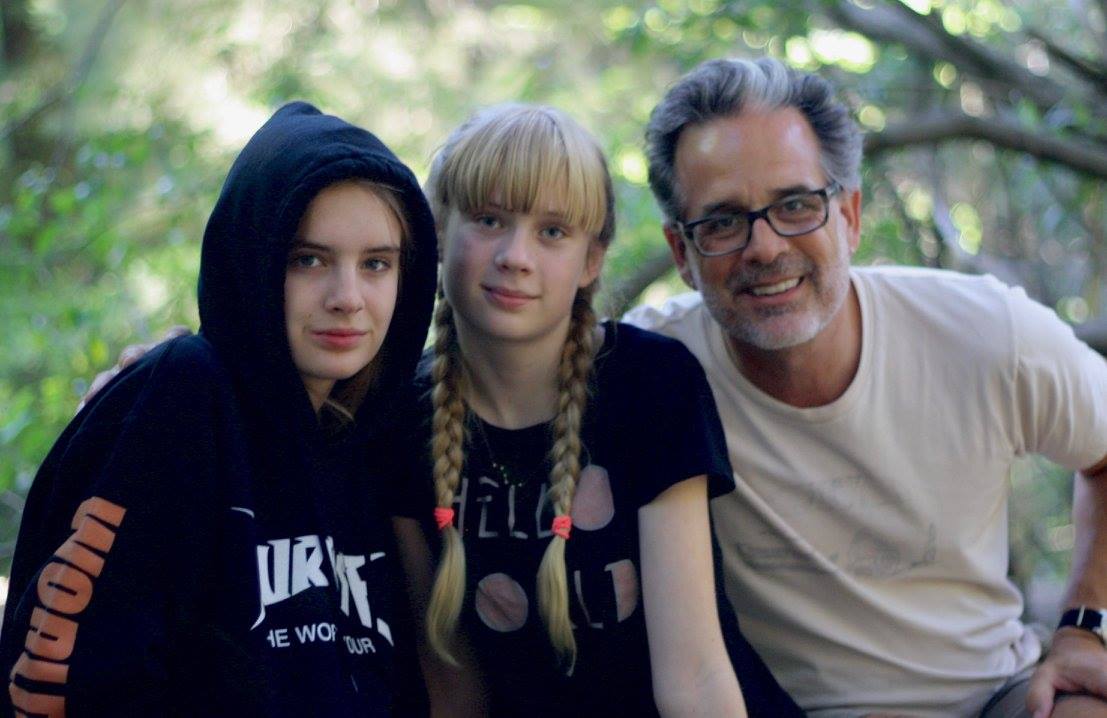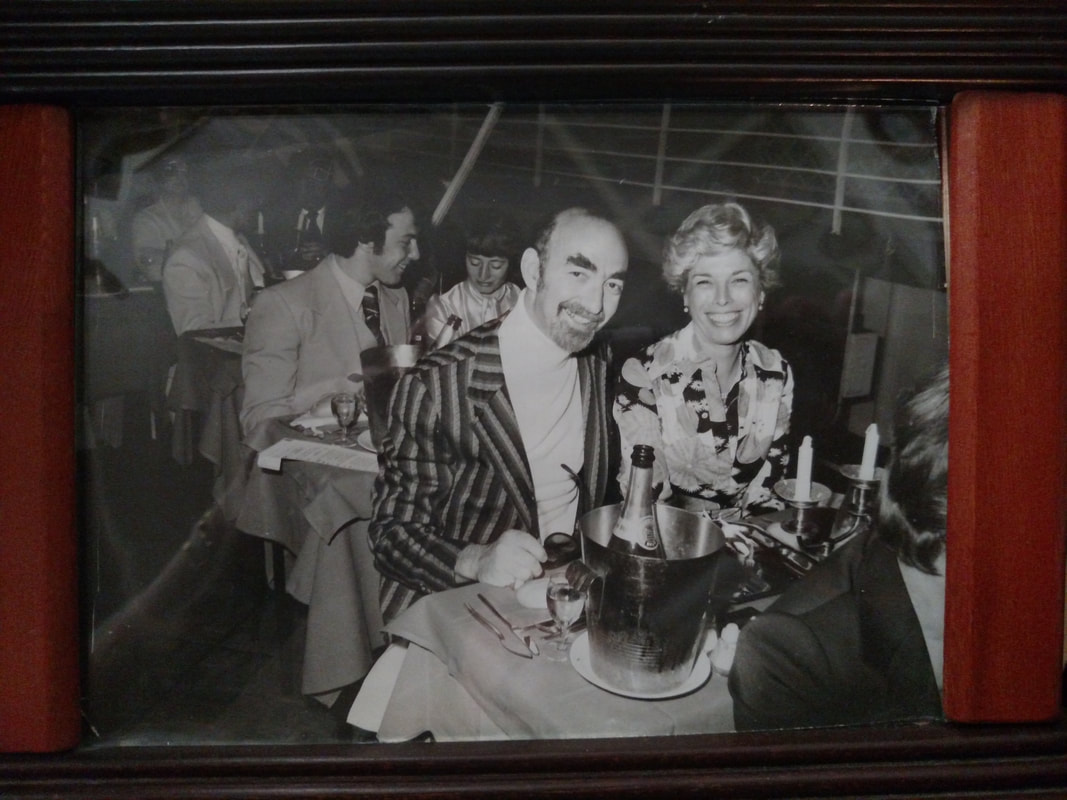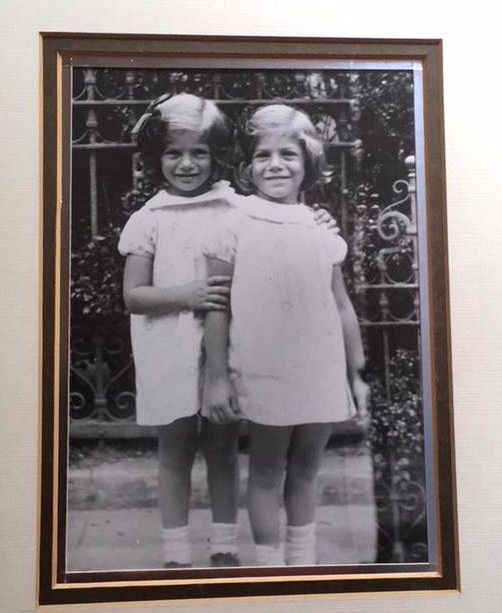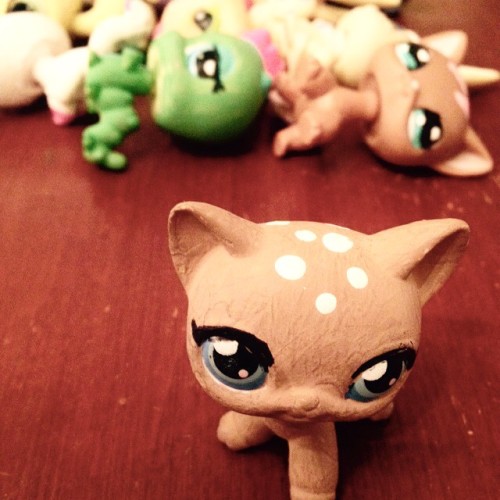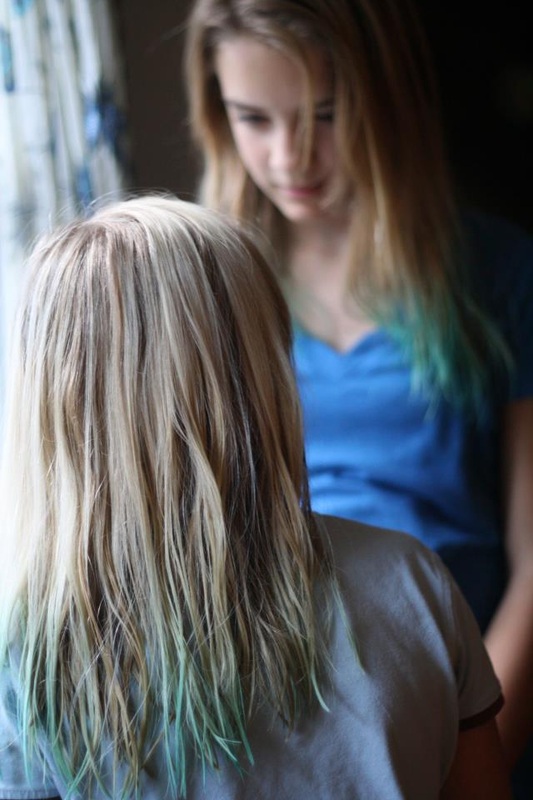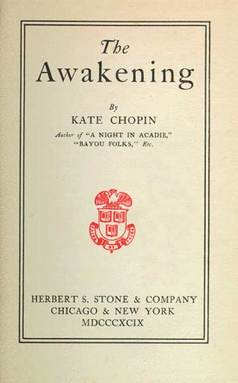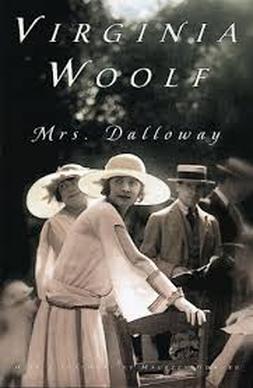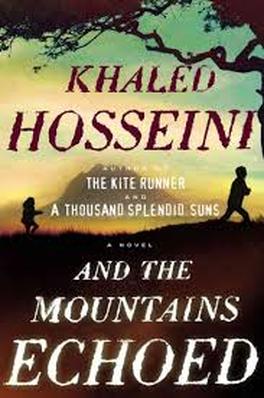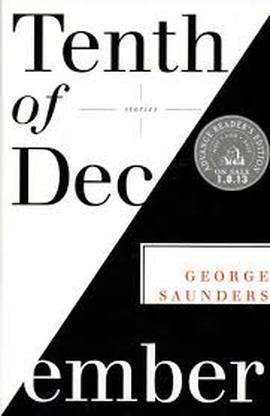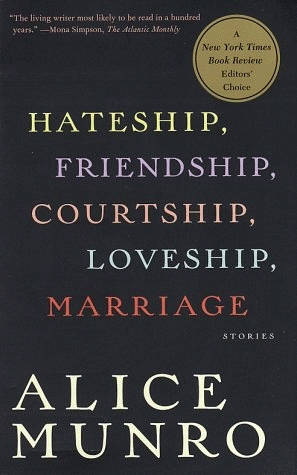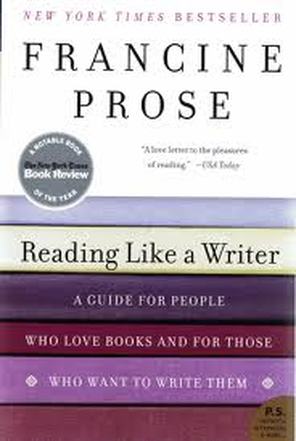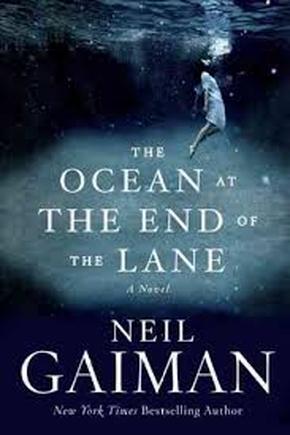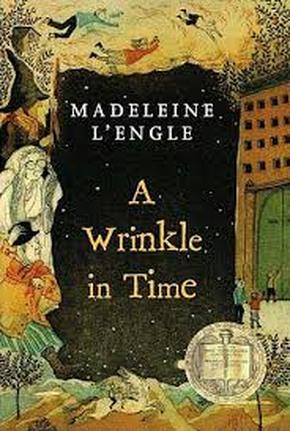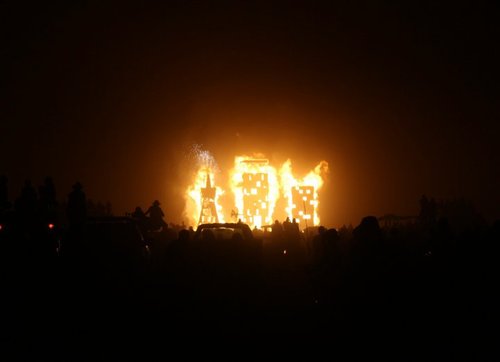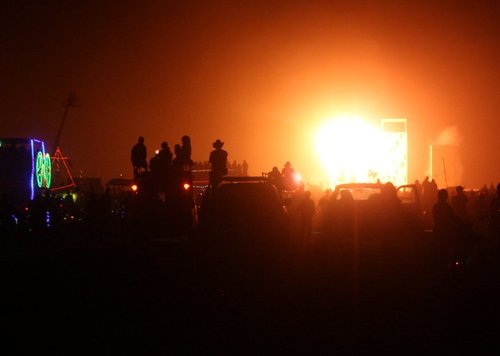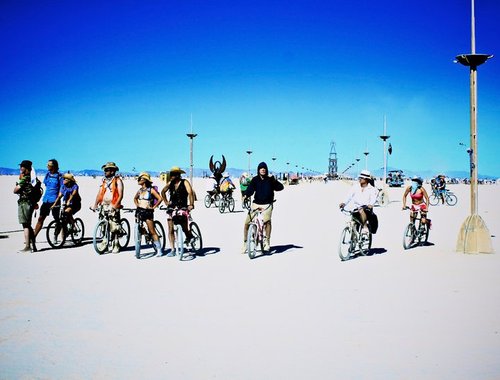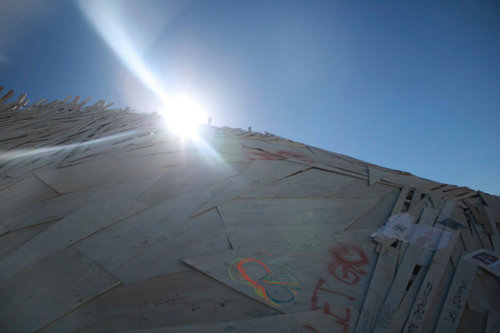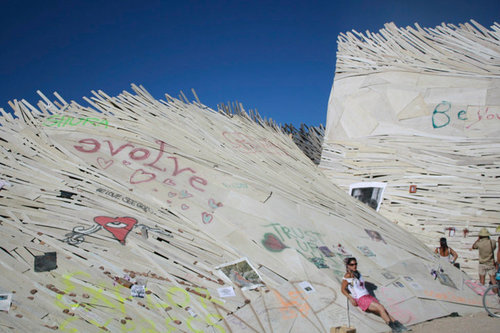|
At the center of everything that I'm grateful for in my daily life glows these three shining lights. I tucked the girls into bed for the first time ten Thanksgivings ago. They were all single digits and glitterbombs, all dolls and painted nails, all make believe and dances. They were so gangly and immediate in their emotions, when they looked to me for some guidance, I think I stepped into adulthood for the first time. They came into my life with a lot of love, but I'd be lying if I said I came in knowing anything about being a stepmom, or that being a parent of any kind, especially during early teen years, is simple. To our girls' credit, it's not easy having two houses and four parents all poking into their business, and they navigated it pretty well most of the time. They made it a little easier for us too: they'd switch around, and one of them always kept our house in laughter even when the other went to the dark side. Somehow - we might have hit the jackpot on this one - they're both shining pretty bright right now, full of creative energy, navigating the middle and late-teens with drive, inspiration, love. Nowadays, with Em already out in the working world, it's generally some combo of us - rarely all 4 - in the same room at the same time. Our house is a whirlwind of the arts - Es always bent over her drawing pads, Em off at auditions or modeling shoots, Darby surrounded by his synths and drum loops, and me working out songs on the guitar. Just in a wee little social media post I couldn't possibly say how much these three inspire me, but Thanksgiving always means a lot to me because of them, and I keep trying, in my songs and stories, to do them justice. I still tuck them in at night with lights-out talks and back massages. So deeply, deeply grateful to these three for bringing me into their family ten Thanksgivings ago. As complicated as parent/child relationships can be, stepparenting has this additional challenge:
There is no guarantee of love. Not at the beginning of the relationship with the kids, not through the years, not from the kids toward the stepparent, nor the other way around, at any point. Stepmothers, in particular, are difficult and complicated for children, because there are loyalties and alliances to the biological mother that the children must navigate. Most times, if the stepmother is there after a divorce in the first family, and there are two households that the children orbit around, the children must learn to adapt to different values, different rules, different cultures, different expectations, different dynamics. Those differences in households are likely some of the factors that led to the divorce in the first family to begin with, and so the stepmother and biological mother frequently do not share values, leading to dynamics between the two mothers that the children must also navigate. The partner - biological dad, in this case - can get caught in the middle as he himself negotiates between his former and present partners. Children always come first, which means that stepmothers must many times bite their tongues, step aside, acquiesce. When the stepmother has come to the family without her own biological children, as I did, she is simultaneously childless and a mother. She may, as I did, have deep desire to nurture the stepchildren as she would have nurtured her own. She may find that the children simultaneously accept some nurturing and reject others -- because, after all, they have a biological mother living not far away. The stepmom in this case must find a tenuous, untrod path to walk that is not depicted in any fairy tale, movie, book, or pop culture touchstone. If she doesn't want to be the "evil stepmother," and cannot be the "good mother," she must invent her own role, and move against every depiction she has ever seen of women's roles in the family. This is what I want to say here: I have found that the greatest gift of stepmothering is a gift that doesn't come easy. With no guarantee of love, many times a stepmother can close her heart, turn away, reject the child and the biological mother and, in some way, her spouse. In that case, no one wins. The other way is harder, but I have to thank Darby for supporting me in my efforts to always choose an open heart. To soften when I want to flare. To talk when I want to shut down. To go upstairs and give love to those girls when I have wanted to hide. There is no guarantee of love for stepmothers, but ten Thanksgivings down, I don't doubt the love between me and my girls. When I say that they have been my greatest teachers, this is what I mean: They have taught me again and again, every day since ten Thanksgivings ago, what it means to choose love.
0 Comments
Pray don't talk to me about the weather, Mr. Worthing. Whenever people talk to me about the weather, I always feel quite certain that they mean something else. And that makes me quite nervous. - Oscar Wilde In the spring you can find our front door with your eyes closed. From the driveway, smell your way to the rose bush. A step or two later, pass between the narcissus blooms under the bird bath and the lavender, which has gone crazy since I planted it beneath the kitchen window box a few years ago. On the right, at the wall of blossoming jade, which started as a tiny clipping from the bush outside my former apartment, lift your foot for one, two, three steps. Here, open your eyes. Though you stand nose to twig at a wintery handmade wreath I found on Etsy a few months ago, there is no fragrance. I should probably find a new one for spring.
You'd better have a key ready, even if you hear voices clearly from within. Even if you knock, the door will not open without your effort. Even if you can report the very movie being watched on the other side. Even if you see through the window beside you the figure of a teenager as she passes from the living room through the dining room to the kitchen for a snack. You could try banging a hefty and frantic boom-boom, as she does every single time she comes home, but it's easier to just use your key. It's not as if you're in a rush: A whiff of orange blossoms floats over the roof from the backyard. Somewhere a finch sings. Inside, a barrage of new sensory input. The 13-year-old is in her chair three feet from the television, ten from the front door. You say "Hello!" in a cheery voice, imagining that perhaps she hadn't heard your car, your steps, the key. Her response is teenagery-dull. You pause for a moment to assess. The Matrix is on, 1, 2, or 3, you don't know (are there more?), but her head is bent over a sketch book. You attempt another greeting. "Whatcha watching?" as if you couldn't tell. "Whatcha drawing?" because sometimes she'll say. Maybe something radical like "How are you?" in another pleasant tone. The elements of simple communication that work so well with adults fall flat. "It's nice out this evening," you say, kicking off your shoes, knowing full well that she doesn't give a damn about the weather, the news, or connecting. I used to resent small talk. The low-hanging fruits of weather seemed only to pertain to the mindless, surface chatter of adults. It neither said anything nor did anything, I reasoned, and I suspect our 13-year-old feels the same, annoyed with the unsubstantial filler. There's an arrogance to her dullness. A judgement, I imagine, that raises her above petty niceties. Say something worthwhile or stop wasting my time. Like the writerly advice from Strunk & White: make every word count. Though she's more likely thinking, Just shut the fuck up. To her, I imagine small talk about the weather seems worth about as much as packing peanuts. Thirty gallons of the Styrofoam kind go for $9.27 at Walmart, so peanuts are basically worthless. Filler to brush away as you root around for the good stuff. Trash them or leave them to dissolve in the sink. They merely take up space and disappear. Like small talk. And yet, $9.27 is worth something, isn't it? People spend it gladly to cushion the good stuff. Olive oil. Porcelain. A vintage keyboard. Even our thirteen year old wouldn't think of shipping a delicate object unpadded to rattle around in a box, take every hit. I'm trying to think of something that's precious to her, an object to name here, but nothing comes to mind. She draws and writes, but appears to care little about anything else. Or this: she is precious; that gruff affect is her peanuts. The disdainful glances, dour responses. She's a newly-minted teenager, fresh out of childhood, en route to adulthood, jostled around at every bend. Her mood is her $9.27 of bubblewrap. It's the hard shell of chrysalid, because maybe she's gone completely to goo inside and needs a stern exterior to ensure her safety. It's scaffolding, because didn't you see the signs? Construction Zone! No trespassers! I get it as best as a forty-something-woman/former-girl with faulty memory can get it, but it's been a minute or two since I was thirteen. Thank the stars. Some day, when she's less gooey on the inside, I wonder if she'll see how stark the chasms can be between two individuals. How we've all been thirteen, all've been goo, but no two goos are the same, and how do we start from that? Humans might be a social species, but how on earth do two people who have been spinning in their own separate orbits all day long possibly begin to connect? Though I used to resent small talk, it's really kind of beautiful, isn't it? Those slender cords of niceties, weather. "Look at that rain": a rope thrown from one to another. It's a hefty job that a beautiful day commands. Wind, clouds, the jasmine in the air: Delicate as they are, their forces are greater than us. I don't know how your day is, nor do you know mine. So let's talk about the weather, enter carefully into each other's orbits, and look up at our shared sky. You drop your bags, prick your ears for the others. Music from the studio: Darby is working on a tune. A scrape on the stove: the 17-year-old is cooking. Meaty scents. It's hard to tell whose dinner, with vegetarian sausages lately so close to the real thing. You make your rounds greeting them, then duck into the bedroom for a quick costume change. The backdoor is open to the early evening. In an old Dr. Pepper bottle on the dresser, Darby's put a twig of orange blossoms, white blooms, green leaves. "I have only to break into the tightness of a strawberry, and I see summer – its dust and lowering skies." - Toni Morrison, The Bluest Eye
July has gone too fast, but isn't it human to eke out just a little more before the last grains of sand fall? A third of July I spent in the northeast, teaching a week of songwriting in Allentown, PA for the International Women's Writing Guild's annual conference at Muhlenberg College, and then visiting friends in White Meadow Lake, NJ, a place where as a child I once lived. When I think now about the conference and weekend after with old friends, I remember stories and clouds. There was a slice, though, of three hours, west of both Allentown and White Meadow Lake, that comes to me mostly as water. It was raining, harder than a drizzle, lighter than a storm, when I parked on the soft shoulder in front of my aunt's house, not far off Route 80. Having packed in ever-sunny Los Angeles a week earlier, I didn't think to bring a rain jacket or hat. My uncle, who sat beyond the porch overhang, who's lived all his life (as far as I know) in the PA clime, didn't have one either. I don't remember us saying much, and we didn't mention the weather. The other water: My uncle made some coffee, I stirred in sugar; I dabbed at my eyes with a tissue from the coffee table at the foot of the yellow couch where I sat with my Auntie Dish, in an art-filled room I vaguely recalled from my childhood; my aunt dabbed at her nose, where the tube of moist oxygen made it feel, she told me, like her nose is always running. It's lung, she said, because I thought it was stomach, which she did have once, along with breast, thyroid, and colon. "The only kind nonsmokers get," she said, without bitterness. I asked her how she felt, thinking both of her, on the edge of something I'm trying to understand, and of my grandmother, who is my aunt's twin, who will be left behind. If learning is a thing we do in school, I never learned to read. I emerged from the womb with a book in hand, like it was a road map to figuring out this life. In the back seat of the Volvo, my head bent to cloth-covered Bedknobs and Broomsticks and A Wrinkle in Time, left over from my mother's childhood, and cornflower blue hardbacks of The Bobbsey Twins. When I was six, we moved in with my Grandma Roro and grandpa in the duplex where my mother had been raised with her two sisters and, on the upstairs side, her three cousins, children of Dish and my rain-immune uncle. The two families propped open the door between homes so the six kids had free reign, like the Bobbsey Twins on steroids. The next year we moved to White Meadow Lake, into what I have recently learned Californians like to call a "cabin." (As far as I can tell, a "cabin," by Los Angeles terms, is a regular house with amenities like a garage door and an attic, but situated on a mountain. Since White Meadow Lake is located in New Jersey, we called it a "house.") I would fall asleep in my upstairs corner bedroom, pretending that I was a twin and my other slept a mattress away. Though I didn't have my own real twin, I took some solace in the rumor that non-identical twins run in families. None of my friends could tell them apart, but everyone in the family knew that Roro and Dish were sororal twins, with nearly identical strawberry blonde hairdos. Maybe what I didn't have, my future children would. Meanwhile, I would play both parts: I would be beautiful like Roro (I was loyal to grandma) and smart like Dish (I'd heard Dish sat for my grandma's math exams in school). Grandma Roro and Auntie Dish were tall, with narrow waists and pleated pants. Each raised three children, though Dish had a boy. My mother was the first of that new generation, and when I came along, Roro and Dish were still young at forty-four, nearly the age I am now. They would sun themselves in the summertime wearing glamorous bathing suits, and I danced around swinging their vintage umbrellas, singing Singin' in the Rain. As I sat on the couch with my aunt, I asked her about a framed photo on the coffee table from around that time, a black and white of her and my uncle side by side, a bottle of champagne chilling in a bucket on the table. The oxygen tank hushed softly in the background, the rain fell forgotten outside. She told me they were on a Paris dinner cruise along the Seine, celebrating their twenty-fifth anniversary, and pointed to a painting on the wall behind the couch that they bought right from the painter on that same trip. "The paint wasn't even dry," my uncle said from his corner of the room. In case you've got a picture in your mind of Dish as an old lady half-unhinged and dying, I can do better. Dish is a great-grandma now. I started calling her earlier this spring, because I'd heard she didn't have much time left, and I'd realized how much had gone by. I didn't know her as an adult, only as I had known her when I was a child, and I wanted to. So I called, and we talked about the other generations, my cousins and their children. Dish made no distinction between her step- and biological great grandchildren, which warmed my heart. It's not that she didn't know the difference, but that she didn't care. Like how I feel about my kids, my step-daughters, they were hers either way. On one wall, I saw a photo of her and Roro when they were near five, which made me think of her mother, my great-grandmother, whom I loved, and who died when I was in twelfth grade. Were they close, I asked. Yes, she said, but paused. "You know what I wish," she said. "I didn't like that she was a racist. It made us all uncomfortable. She'd say shvartze, and not in a good way." We stayed for three hours on the couch, me asking questions as best I could, her answering as best she could. I wondered if there is any way for me, in this vibrant moment of my life, to fathom the way time crawls at the end. I thought of mothers-to-be, in the last weeks of their pregnancy, wishing the baby would just come already. Is it that way at the end, too? The bookends of life, slow, between which we love and fight and worry about bank accounts and career choices, and try to make some meaning out of the arbitrary event of our being? When we are born, we survive from mother's milk, and spend the rest of our living days eating from Mother Earth. Maybe at the end it's just waiting, waiting, waiting to go back home. Before I left, I asked how she felt. I meant body, but also heart and mind. She told me she's ready to go, not in pain at all, but ready. However, she's concerned that Roro hasn't yet accepted that her lifelong companion will be leaving first. In my twin fantasies, it had never occurred to me that, as at birth, one always passes through the barrier first. A few days after I saw Dish, I heard that she'd stopped eating. That was two weeks ago. Her body no longer needs to sustain. Soon, Mother Earth will feed off her. I hear the hospice nurse rearranged the living room, and Dish has a bed there now, and a rotating watch, made of her daughters, Roro and my grandpa, my mother's sister, and my rain-immune uncle. They recently did a genes test and found that all these 87 years everyone was wrong: Roro and Dish, it turns out, are identical. Makes sense, since identicals don't run in families, and they're the only twins on that tree branch so far. I've been trying to figure out if I should go back for the funeral, whenever it happens. I think of Roro, and want to comfort her. But I think, too, of my daily plans here. Of the syllabus I need to write; of the long and expensive airline flight back east; of my meager days off from work, already in the red, and of the David Wilcox songwriting retreat a few weekends from now; of the work I like to do and want to do, because it gives my life meaning between, as Joni Mitchell says, the forceps and the stone. By the time we hugged good-bye, because Dish and my uncle had a doctor's appointment and I was heading to White Meadow Lake to reconnect with old friends, tears had choked my throat too tight for me to say anything. If I could have, I would have said Thank you and I love you. I think she knows that. Of course it was pouring, too, because that's the way the east coast does weather: When you are saying good-bye to your great aunt for the last time, the clouds don't hold back. I closed myself in the rental car and let myself sob, and when I could see through my tears, I turned on my wipers and pulled onto Route 80 heading east. Last year, Shiloh's dad, her mom, her stepdad, and I spent Ash Wednesday with her at Childrens Hospital LA, because in the 6 weeks prior, this little one had become thirsty beyond words and had gotten too skinny too fast. She failed the easiest test in the world: a prick of blood from her finger. We found out that her beta cells had crapped out on their only job: to make insulin.
Ash Wednesday was day 1. Shy was paler than white as we learned how to administer the insulin shots that she'd need 6-10 times daily. A dietitian who looked like she needed a dietitian showed us with dirty rubber food toys how to measure carbs for a kid who'd never heard of the Atkins diet. A kind nurse who showed us her pregnant belly and told us that she'd been diagnosed with Type 1 Diabetes when she was 13 drew pictures on a white board of beta cells and sugar molecules and charts with arrows that pointed to optimal blood glucose levels. Only later, I realized why many of the hospital staff had smudges on their foreheads. I don't know much about the holiday except that it comes after a time of carnival, filled with carbohydrates that we, as of that day, needed to count carefully and measure in ratios of 1:14, 1:17, 1:15 against the insulin that, we were shown as Shy folded over the waistband of her pants, would be injected into whatever fat we could find on her skinny little body. That night Darby and I went home and drank a lot of wine because Shy went to her mom's house for the first night with T1D. The next day, she didn't go to school, or the day after, or many of the days -- 40%, perhaps? -- of the rest of the school year. She stayed with her mom for those first few nights. Darby spent the days over at his ex's house, the first time he'd had to spend so much time with her since 2006 when they realized that they didn't like spending so much time together. I, the stepmother, didn't go. Instead I went crazy at home wanting to see my sick kid who is another mother's kid. When Shy came back to our home, the every-three-hour blood sugar tests started. Darby took midnight, I took 3 a.m. Eventually Shy learned to sleep through them as we swabbed her finger with alcohol and pressed the tiny needle till a drop of blood squeezed out. In those first few weeks, she was starved -- literally. Her body had been starving without insulin to process the energy-giving sugars from food. She watched the clock and asked for a snack or meal every two hours, plates full of food. We shot her with needles and her spine and hipbones softened, but Little Miss Sunshine now had a body that no longer worked in concert with her mind. She fell into months of depression, angry at the new normal, questioning mortality, wishing she had not been born. Her older sister felt scared, at first, and then angry at how we all stood in the kitchen with calculators, adding up a cup of cereal and five strawberries and a quarter cup of soy milk, and how many carbs do you think this banana has, anyway? We pulled the insulin through the syringe while Rose had a tantrum because she was trying to tell us about something that happened at school, and Shy had a tantrum because she was sick of always getting shots, especially the ones at night that stung so bad we couldn't understand. We set the timer on our phones and Shy listened to her stomach grumble and watched Roo eat whatever she found in the cabinet, as she waited 15 minutes before eating the cereal and strawberries. By then she was hungrier than she thought she'd be, or not hungry enough to finish, but she'd already received the insulin and so had to eat exactly what was on her plate. Shots and finger pricks and tantrums and carb counts, Easter and her 11th birthday and then September came and the doctor called to say that on Rosh Hashanah we should all come to Childrens Hospital to learn how to use the insulin pump. On the Jewish new year, a nurse taught us how to insert and change the catheter every 3 days that would replace the syringe shots. The pump was hot pink, chosen by Shy for its color, which, we realized later, matched her school backpack and Luna Lovegood Halloween costume. We wanted to love the pump, but the insulin-carb ratios were wrong, and we didn't know that when Es fell into another depression, barely noticeable because she'd not really come out of the first one, it was due to her blood sugars riding too low. Though she tried to smile, she sat on the couch for most of our wedding celebration in September, didn't have cake, couldn't enjoy the company of the other kids. A few weeks later, the doctor adjusted the ratios and we saw the light come back to her eyes, the roses return to her cheeks. In her latest photos, you can see her new medical alert bracelet -- she went through three or so, but they all broke. The pump is clipped to the top of her pants. I'm now looking at a photo from a month after the wedding, 5 or 6 weeks after she got the pump, and one of the first days of smiling, which she does now frequently. Next week, instead of Childrens Hospital, we'll take her to Disneyland. She wants to celebrate a year since her diagnosis, which might sound strange to someone who hasn't witnessed her journey firsthand, but it's not strange to me. She should celebrate. She should be proud. These words don't really capture what Shy has been through, but though there's currently no cure for T1D, she has gotten through this grueling first year, and is healthy and thriving. This piece first appeared in the literary journal Lunch Ticket on 23 January 2015:
http://lunchticket.org/one-night-strunk-white/ When my fifth-grader returned home Saturday after a week at Outdoor Science School, she brought a twine necklace strung with acorns and colorful beads, an endless stream of facts about the natural world on the mountain, and several riddles she learned from her counselors. Her week at OSS was the first time she’d been away from home, and so when she ran into the house she was overflowing with excitement about her first trip. The cabins (top bunk!); her meals (dessert every day!); the animals (baby frogs and a corn snake!); the owl pellet she dissected (a mouse skull and a shrew bone!). All day, until she was tucked into her bed and finally lulled to sleep by the tap-tap-tap of raindrops against the window pane, the house was filled with her lispy, delighted, never-ending anecdotes. I try to be an involved parent. I try to ask the kids engaging questions, encourage them to dig deeper into the events of their day, reflect back to them what they say so they can hear it for themselves, and then allow them to enhance or revise or elaborate. But on Saturday, juggling good parent practices with my overwhelming stack of spring semester work? Let’s just say that while she happily shared her OSS adventures, I alternated between listening and musing on the phrase “what you resist persists.” Open on the table in front of me lay Strunk and White’s The Elements of Style. I had resisted it since high school. That I have not ever read this slim volume is a bit hard to justify. It takes a day to read, and afterwards not much space on the bookshelf. It’s available for free online in pdf format. Most importantly, though, for an MFA candidate with an affinity toward writing, teaching, and editing, it’s an essential tool that cannot be ignored. Eliminate three out of those four--MFA candidate, writer, teacher, editor--and it is still necessary. When I recently began serving as Blog Editor here at Lunch Ticket, I realized I cannot continue to ride on my grammar and copyediting intuition. I need the vocabulary to explain my editorial suggestions. I need clear reasoning for my choices. I need cold, hard, plain, simple, black and white—Strunk and White--guidance. Dry, right? Elements of Style, though, is not as much about boring rules as it is intelligent advice. All writers of any genre need to craft clear, effective, engaging, bold sentences. Whether novelist, memoirist, or blogger, not having a handle on these tips is a liability. In E.B. White’s introduction, he quotes from Strunk’s principle #17 (omit needless words): Vigorous writing is concise. A sentence should contain no unnecessary words, a paragraph no unnecessary sentences, for the same reason that a drawing should have no unnecessary lines and a machine no unnecessary parts. This requires not that the writer make all sentences short or avoid all detail and treat subjects only in outline, but that every word tell. “That every word tell,” I reread several times. It is a compelling statement. With the drawing and machinery comparisons, it hits home. Unnecessary words and unfocused structure are part of the first-draft process, but a discerning reader can tell a first draft from a polished piece. First drafts hem and haw. They clear their throats and hesitate over ideas. They meander. A discerning reader—an editor, say—may wade through, but a non-discerning reader won’t spend the time traversing rough spots to mine the gems. They will simply move on to another story. Strunk and White’s statement is, in four words, an argument for careful revision. The Elements of Style provides the writer a checklist for that process. The book begins with basic punctuation and grammar rules that any writer should inherently know, followed by a list of composition principles I wish every blogger, essayist, reporter, memoirist, novelist--even Facebook poster, dare I suggest—would consider. Structure of the parts, and of the whole. Clarity of expression. Parallel construction of ideas. Economy of words. Verb tense agreement. While I scratched notes into the margins, my kid bounced off the couch. “Do you like riddles?” she asked, stopping her dance mid-twirl, arms spread out wide. At ten, truly, all the world’s a stage. She is an effervescent joy to our family. She has super powers, has been writing a book since third grade, and has well-timed, absurdist humor. It seems, while she has watched her older sister navigate teenage dramas, she dug her heels into childhood, determined to hang on to simple pleasures until life insists on the inevitable next phase. I can’t say if it’s her jokes or her giggles, but at least once a week we all--even the teenager--end up laughing till we’re in tears. Here’s one of the riddles she brought home from OSS: Q: One night, a king and a queen went into a castle. The next day, three people came out. What happened? A: One knight, a king, and a queen went into a castle. Obviously, the homophone is the key. Night/Knight. Half-listening to her and half-studying Strunk and White led me to consider this riddle from a craft perspective, and I found two other tricks within it that are meant to confound the listener. Sleight of hand is a puzzler’s prized tool, and a riddle’s only goal is to hide an answer in plain sight. When this teaser is spoken aloud, you can almost hear the lack of comma between “a king and a queen”. A serial comma, as I inserted in the answer above, further helps to reveal the three people who emerged from the castle. The most cunning tricks, though, are the most subtle. As I turned this teaser over, a topic covered in Part II of The Elements of Style came to mind. This is a principle Strunk and White call “express coordinate ideas in similar form.” They write: This principle, that of parallel construction, requires that expressions similar in content and function be outwardly similar. The likeness of form enables the reader to recognize more readily the likeness of content and function. Exactly contrary to Strunk and White, this riddle utilizes non-parallel structure to help mask its solution.One k/night is followed by a king and a queen. This use of non-parallel structure is meant to trick the listener. Until now I’d never dissected a riddle. I suppose if you are a riddler, you might consider using non-parallel structure as a tool to disguise the solution. For other writers, however, our goal is not to confound the reader, but to write as clearly as possible. We puzzle in our process so there is no confusion in our final manuscript. We should always strive to give a reader the clearest expression of our thoughts. For parallel structure, we would write one knight, one king, and one queen or a knight, a king, and a queen. Parallel structure. Clarity of expression. Concise writing. As my joyful kid twirled her way through the afternoon, and I made my way through The Elements of Style, I found myself siding with past teachers who once waved their copy of this book to the class. Anne Lamott writes in Bird by Bird, “the only way I can get anything written at all is to write really, really shitty first drafts.” She goes on: You need to start somewhere. Start by getting something--anything--down on paper… [But] the third draft is the dental draft, where you check every tooth, to see if it’s loose or cramped or decayed, or even, God help us, healthy. Another joke from OSS: The present, the past, and the future walk into a bar. It was tense. With all those mixed tenses hanging out together, I am sure it was. Luckily, this and other things are covered in a beautifully quick read: The Elements of Style. What, you don’t have a copy? Get a copy here (or wherever you like to get books), or download a pdf version here. This piece was reprinted at the fabulous online mag RoleRoot on June 2, 2014. http://www.rolereboot.org/family/details/2014-06-cant-attend-middle-schoolers-graduation/ It's a good name - "middle" school. They're not quite who they used to be, and not quite yet who they're becoming. We were so haughty at 6th grade orientation three years ago - we thought we knew our girl. But middle school is somewhere and nowhere at once, and like a tilt-a-whirl it shakes you up and spins you silly till you want to puke. Then it spits you out, wobbling on the street, in an dazed aftershock.
Although I can be sentimental, here at the end of middle school the only sadness I truly have about these past few years is that today my middle schooler moves on, and I won't be at her graduation. In an old-fashioned twist of cold shoulder policy, each graduating child gets exactly and only two tickets for today's ceremony. Only her mom and dad will go. No stepmoms. Her sister, her stepdad, and her godmother won't be there either. Over all, no recognition of the village, or the times, or the tremendous accomplishment that, somehow, all of us survived middle school. Q: How many middle schoolers does it take to screw in a light bulb? A: One -- she holds it in place and lets the world spin around her. Or is it: None -- they're all on Snapchat. The middle school years, with the sky-high and death-valley mood swings, was challenging to us all. The love-is-all and hate-you-all sway; testing rules and parents and pretty much anything from anyone over 30 or without a catchy chorus. These few years have been the toughest of step-parenting so far. Meaning: they have been gloriously rewarding. As a step-parent, I have the dual role of managing my relationship with the kids and managing my relationship with the kids as influenced by their other household. I've tried to keep my eye on the long road -- I have a vision of us ten years from now, sharing a bottle of wine in front of a campfire, shooting the shit, sharing stories. I try not to get caught up in the weather at any particular bend -- even when it has blown in gales from the other household and poured down directly on me. Luckily I have a steady and wise companion. He's known our middle schooler since birth, and he knows the other household well. Like all of us, he's navigated the middle school years without a north star, but when I've gotten close to rocky shore he's shined a light to help me back to calmer seas. There's a sweetness our middle schooler used to have that still peeks out, and I think it will re-emerge more fully as the years go by. The snarkiness that jokingly showed its face 3 years ago became almost malicious through 6th and 7th grade, but lately, mostly, has tapered. She's more self-controlled. More compassionate. More discerning. She's fiercely driven. She gets incredibly frustrated, and is slowly figuring out how to work through her difficulties rather than throw up her hands in feigned apathy. Me too. While she was learning algebra, I learned patience. While she was navigating her social dramas, I navigated dual household dynamics. While her moods were swinging like Madagascar monkeys, I learned to be kinder, more steady, open. She didn't do well on every test. Neither did I. High school, they say, is tougher. But I'm not looking at high school yet. Right now I'm looking at a girl who is almost my height. With blond hair, blue eyes, and slender figure, she's a knock-out, and she looks nothing like me. I wasn't there the day she was born. I missed her first nine years. I didn't help her learn to read, and sadly, never sang songs to her in the bath. But: I measure her height on the kitchen doorpost. I help her with homework, band aids, boys. I am sometimes, when lucky, her sounding board. And when I am unlucky, I feel her fury. She tells me her dreams. She asks me to help her visualize them. She is my oldest daughter. She's big as a grown-up now, but every night we still read bedtime stories. She giggles until tears pour down her cheeks about a line from her favorite book in the Laura Ingalls Wilder Little House series, Farmer Boy. When the lights are turned out, I give her massages to work out the tense muscles from horseback riding and dramas at school. I cover her with a blanket and a hug. I tuck her in. So, I won't be at graduation. I'll hear about it, like so many things, second-hand. I'll see the diploma later, maybe, and the photos of her graceful walk across the stage. But, we'll have a celebration dinner this weekend and begin to settle into the languorous days of summer. We'll discuss plans for the next few months - sleep away camp, time at the barn, Disneyland, camping, bike rides. Of course, if it's anything like last summer, these next few months are bound to hold plenty of drama, especially after camp. It'll be interesting to watch how it plays out. I suspect, though, that it will be a grass-blade's-width easier. She is more polished for the rub of middle school. Ah, don't you know, we all are. Was it intentional that yesterday, with the growing stack of hand-scrawled note paper tucked into the back pocket of my bag and the deadline for their neatly typed untanglement gnawing at my mind, that the Residency schedule handed me first a lecture on breath in writing and then a seminar on meditation and chant? Yesterday, Day 7, was a gift of non-linearity.
In both classes yesterday morning, I planted my feet firmly on the ground, shifted my spine upright and away from the chair back, closed my eyes and breathed long and slow. The second seminar, led by one of the writing mentors who is also a Kundalini yoga teacher, was a solid two hours of kirtan dance, kundalini chant, pranayama and mantra. Not counting the Metallica I blasted down the 405 on Saturday, it was the first time I'd heard music all week. I closed my eyes and let the rhythm and song sway my bones that have been folded into right angles. We chanted Ong Namo, Guru Dev Namo, and the tight lines of sentence and story structure slackened into ribbons and streams. Afterwards, in a fevered rush to write faster than our minds could race, we pushed our pens across the page without agenda, prompted by "Disco" and "Zebra", unleashed by the meditation and chant that came before, and fell into uncharted territory, pulling from hidden nooks of memory and desire. It was like rolling down a grassy hill, laughing and falling into a pile of daisies at the end. It was like eating ice cream before there was any mind chatter about calories and clothes. It was like playing music when the notes just sail from the horn. It was like riding a bicycle home. Later, while standing on line for a salad at the little shop across the way, a classmate said to me, "You sounded like the ocean." I told her about ujjayi pranayama, victorious breath. I asked her about the little aluminum-backed book in her purse, and she showed me her bible, all dogeared and doodled with colored pencil. She told me how in love she is with Jesus, how he has saved her and loves her. I told her about Rumi and Hafiz, and how they felt the same way. We ate our lunches together and spoke with open-hearts about life and spirituality, without fear of difference or coldness of ego. I got home late last night, but Darby and the girls did too. It was a lively house at ten. Emerson was still dancing because her holiday choir concert had just ended and she was wired and hungry and happy. Esme was dancing because Emerson was dancing. Darby was happy because his girls were happy. I was, of course, exhausted. I've finally succumbed entirely to the cold that has been threatening to settle in my lungs. The cough has deepened, the sneezes sudden and loud, my voice barely over a whisper at the end of the day. But, the girls were wired and giggling, and they would not let me crawl into bed. They flung the covers off me, yanked at my arms, tickled my feet, pushed and pulled and twisted me in knots, until I finally surrendered to their love and threats, crawled up with them to the birdsnest and tucked them into bed. Last night I slept for the first time since last Thursday. I laid on my belly, pushed away the pillows, and didn't move for hours. In the morning, just before the alarms sounded, Darby lay next to me, listening to my sleep. He watches over me, I know, sends me love in those quiet hours when I'm still deep in dream. Was it the breath or the chant? The meditation or the music? Maybe it was the fierce love and laughter that tugged at my weary limbs, and pulled me despite my protests, out of story structure and back into the home I adore and the family I love. It's a strange thing to leave the comfort of a perfect life to reach into unknown territory for unknown riches. It's a beautiful thing when the perfect life pulls you back in from the abyss. Sometimes it tickles you halfway to death, and then insists that you kiss it goodnight. Jesus, Darby, Kundalini chant, girls, music... whatever it is that gives you the love you need at the moment you most need it is perfect, perfect, perfect. I'm thankful for my swim lessons earlier this year. They taught me how to breathe while in over my head and overwhelmed with sensation -- and how not to drown. This summer, the metaphor of breathing, learning how staying afloat, and understanding when to open my mouth or keep it closed helped me immensely during the most challenging moments of my stepparenting life so far. The lessons I learned in the pool were invaluable in my home, and in helping me to soften into the turbulence of teenage-hood in a blended family. The child who once laughed and loved me easily is growing, testing, changing. She is a glorious being and I am endlessly honored to be one of her parents, but being a stepparent is an interesting role. Sometimes we have it easier than anyone, but many times it's the most thankless role there is. Every Saturday when I returned to the pool, the lessons I learned there solidified. How do you go with the flow when the swimmer in the next lane is doing butterfly laps and churning up whitewater? You learn when to open your mouth, and when to keep it closed.
Now, on the cusp of a new adventure -- this week I begin the course work for my MFA in Creative Writing -- I am again thinking of the pool. I am thinking of the fear I had the first time I jumped in, of the self-consciousness I felt floundering in my beginning strokes, the fatigue that each session wrought in my limbs, the strangeness of showering and undressing in the locker room. The 10-day residency that marks the official beginning of my work begins tomorrow at 6 p.m. I have been reading like a fiend, trying to get through the required reading and pre-residency assignments, but I have also been taking conscious time with Darby and the girls. Even as I type here, there is an unfinished game of Shrek Monopoly precariously open on the coffee table, inviting the pounce of little paw feet. I have a date with the family to finish this game tonight right after work, and hopefully the cat will not disrupt the properties. Over the next ten days I will miss bedtime stories, choir concerts, and acting class demonstrations. I will miss dinners and early morning dream-swaps with Darby. Oh, but what will I gain? That is a mystery that is only beginning to unfold. Meanwhile, since this is what I have been doing lately, I thought I would share with you some of the books I have been reading. Perhaps, if you have just finished your latest novel and are without another on the nightstand, you will be interested to try one of these. Never fear, my copies will be back at the library shortly. This one -- The Awakening by Kate Chopin -- was one I have been intending to read for years. My singer/songwriter friend Rebecca Loebe claimed it was her favorite, and urged me to read it during our Berklee days. Later she later wrote a lovely, moody song titled "The Awakening by Kate Chopin" so you can probably guess this was my soundtrack through the week of reading. (Listen to the song here. Buy it here -- support indie artists!). I think ideally I would write a blurb about each book I list, and this is something I may do in the future, but for now I have more writing/reading to finish before class tomorrow night. For now I will leave you with images, and the urge to read books. Every year at the end of August a temporary city pops up on the alkaline sand in the middle of Nevada's Black Rock Desert. Folks trek across the country, some from other corners of the world, to participate in its creation. The population numbers vary, but in recent years it's been in the range of 48,000 - 60,000. With planned infrastructure and unplanned whimsy, this is not so much a festival as an alternate reality. The weather is harsh. The stars are brilliant. Time of day is measured by the sun and moon. Time of week is marked by large installation artworks being set on fire. Back in my East Coast days I'd sometimes hear mention of Burning Man. Maybe the word's spread, maybe it's the advent of Facebook, or maybe it's just because I live on the West Coast now, but it seems pretty much everyone knows a thing or two about it. That said, if you want to know more you can read more about it here or here or here. Or, if you want to just know about the ticket fiasco that happened this year, you can read about that here or here or, for a summary and also an excellent lesson in public relations, here. I've only been once, and had ambivalent feelings about it. I was giddy in love with Darby and we celebrated our 1st year anniversary there. We stumbled into circuses, live music, strange art, inspiring people. It was our first week-long vacation together and I wanted to be perfect. I wasn't perfect. The last two days I had a headache from the almost-constant dust storms. It was exhausting. It was an adventure. I was in grief. Planning for a week on a different planet -- that is what it feels like -- takes some forethought. When we decided to go again this year we also began looking forward to the summer months of creative preparation. In this Year Of The List I jotted down some Burning Man intentions: #36 - Contradance at Burning Man #38 - Drink a beer at a Burning Man theme camp #52 - Give gifts of food at Burning Man (cook pancakes on the ashes?) (vegan s'mores from our bike baskets?) (middle of the night vegan hot dog stand?) I suppose everyone has their reasons for wanting to take a journey into the desert. There were many reasons for me, but this year the two biggest were: #85 - Go away for a week with Darby And, to go back to the Temple. Burning Man is bigger than a song, it's like a symphony. It is built, thrives, and then is burned to the ground. Ashes to ashes, desert to desert. It is like life, only smaller, so you can see the whole picture, or at least a whole picture. For everyone it's different, but it is always temporary. Like music. Like life. The Temple looks different every year. I suspect, however, that the feeling around it is generally the same. It is a sanctuary, it's a wedding chapel, it's a wailing wall, it's a grave stone. The walls are filled with love, release, anguish, and hope. There are Sharpie marker dedications to lost loves painted on the walls. There are angry notes folded into cracks. There are witnesses and wedding vows. There are platitudes. There's a hush in the air, a respect for the grieving. And then, like so many of the other structures built for Burning Man, on the last night of the week, the Temple is released in flames and ash into the desert night. That last cold night of our first Burning Man together, I huddled with Darby as the Temple ignited. For the first time that week, everything was silent. 53,000 people stood in a wide circle around the Temple, and you could hear the flames. With the love and loss that had been graffitied on the Temple walls all week, I released my own well of sorrow that had been building for some time. The columns of smoke swirled into the night like souls being released. Tears ran down my face and my stomach tightened. I felt the baby that I had long dreamed about finally release into the dust and stars of Black Rock Desert. I was never going to have a child of my own, I had known that for awhile. But as I stood there in the dark with the man I knew to be my soulmate, I sobbed in grief. The man I loved was the best father I could imagine, and he already had two wonderful, beautiful, fabulous girls. I knew we wouldn't be having another. That night in the desert I buried the baby I would never have. A week later, back in Los Angeles, I still felt shell shocked. I walked around numb, and then drove out alone to Joshua Tree -- a different desert, with different people. There I spent a quiet few days amid the celebration of a music festival my band was performing in. While I was there I reached out to a friend who had lost her father. How could I grieve for something I never had? She helped teach me how to mourn. I reached out to another friend who had never had children. How did she release her desire? She helped me find peace. When I got home, I reached out to Darby, my sweet man who I know wishes he could fix any sadness I have, but who I knew couldn't fix this. I learned how to ask him to hold me in sadness, without trying to fix anything, and let it work its way out. It took a long, very long, time, but eventually it did. About ten months later, Darby and I moved in together and started creating a home. Now I have kids every Monday, Wednesday and Saturday. There are school events. There are camping trips. There are holidays and hard questions. There are sick days and cranky days and happy days and goofy days. Little by little I am learning how many ways there are to be a mother.
Someone told me once that in Sweden a step-mom is called a "bonus mom". It doesn't resonate with me. I was never one for extra credit, I never cared for add-ons. The fairy tales all show step-moms as wicked and unfair. That is not the story I carry in my heart. I have no template for how to do what I do, how to be what we call "a step-mom". From my own fragmented upbringing, in a way this is a blessing. I cannot turn into the models I had, because I never had this model. Well, this is Burning Man week. We tried to get tickets several times earlier this year, but after a few months of frustration we decided to let it go. The ticket fiasco complicated our plans, and although many available tickets popped up recently, we'd already let our desire to go slip away. Over the months of the fiasco evolution I rewrote The List, nixing Burning Man for the year. We are here in LA. This weekend is the anniversary of our first date -- the most wonderful first date in the history of humankind -- so instead of the desert we're heading to a little cottage on the beach to celebrate. We will ride our bikes along the boardwalk, hunt for seaglass, toast over cocktails. My sweet man and I will write our love and our hopes in the sand, and release them to the Pacific tide. |
Archives
May 2019
Categories
All
|
